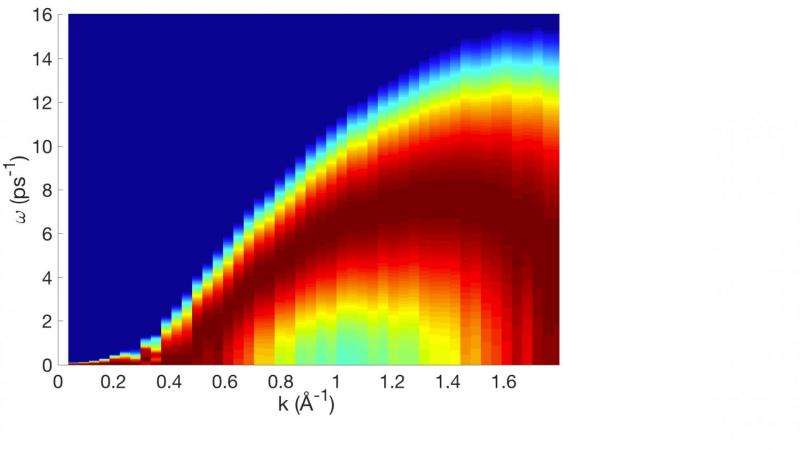Liquids are capable of supporting waves with short wavelengths only

Flowing particles in liquids act as a filter to suppress long-wavelength waves but allow short-wavelength ones to be supported, according to physicists at Queen Mary University of London (QMUL).
Liquids are the least understood state of matter and for a long time it has been believed that they can sustain both gas-like waves with long wavelengths and solid-like waves with short wavelengths, but it wasn't clear just how solid-like waves propagate in liquids.
The researchers found that a gap emerges in the liquid wave spectrum. This gap implies that only short-wavelength solid-like waves can propagate. This understanding will allow researchers to develop the theory of the liquid state and opens new avenues of research into liquids.
Using the predictions from their recent theory, the researchers have performed an extensive modelling study to ascertain the gap and discuss its properties in the journal Physical Review Letters.
Lead author Dr Kostya Trachenko said: "This result is important for the fundamental understanding of liquids and gives us hope that we are getting close to constructing a consistent theory of this elusive third state of matter. We have good theories of waves in solids and gases but, surprisingly and despite many decades of research, not in liquids."
He added: "The difference between liquids and solids is that particles rearrange in liquids with a certain frequency – this enables liquids to flow. These rearrangements disrupt the propagating waves but they do so in an interesting way. You can think about these motions as microscopic demons living in the liquid which eat all long-wavelength solid-like waves but leave short-wavelength waves intact. In other words, flowing liquid particles act as wave filters which is an insight not hitherto anticipated."
The results are also important for widening and optimising industrial processes where supercritical fluids have started to be widely deployed including in cleaning, extracting and environmental applications.
More information: C. Yang et al. Emergence and Evolution of theGap in Spectra of Liquid and Supercritical States, Physical Review Letters (2017). DOI: 10.1103/PhysRevLett.118.215502
Journal information: Physical Review Letters
Provided by Queen Mary, University of London





















